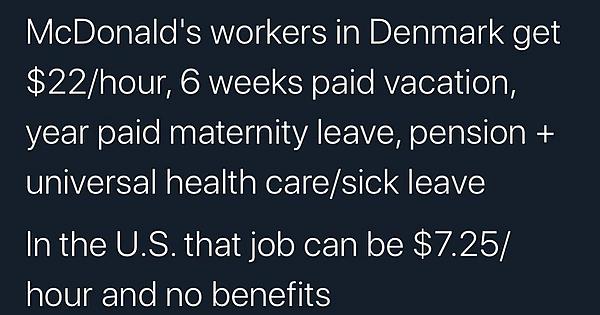I'm citing the NYTimes because you're a Lib and you're supposed to pass this along to your Lib-ass friends.
https://www.nytimes.com/2020/05/08/opinion/sunday/us-denmark-economy.html
Starting pay for the humblest burger-flipper at McDonald’s in Denmark is about $22 an hour once various pay supplements are included. The McDonald’s workers in Denmark get six weeks of paid vacation a year, life insurance, a year’s paid maternity leave and a pension plan. And like all Danes, they enjoy universal medical insurance and paid sick leave. One reason Denmark was more effective than the United States in responding to the crisis is that no Dane hesitated to seek treatment because of concerns about medical bills.
Abu Sayeed knew that Americans working in fast food don’t do so well. “I heard about the movement,” he said, trying to remember its name. “Fight for something. Fight for $20? What was it?” “Fight for $15,” I explained. “They want $15 an hour. There was an awkward silence. He nodded sympathetically. Then he tried not to sound condescending. “I feel for them,” he said earnestly of American workers at McDonald’s.”
Danes pay an extra 19 cents of every dollar in taxes, compared with Americans, but for that they get free health care, free education from kindergarten through college, subsidized high-quality preschool, a very strong social safety net and very low levels of poverty, homelessness, crime and inequality. On average, Danes live two years longer than Americans.
A Big Mac flipped by $22-an-hour workers isn’t even that much more expensive than an American one. Big Mac prices vary by outlet, but my spot pricing suggested that one might cost about 27 cents more on average in Denmark than in the United States. That 27 cents is the price of dignity.
Americans assume that Danish wages must be high because of regulations, but Denmark has no national minimum wage, and it would be perfectly legal for a construction company or a corner pizzeria to hire workers at $5 an hour. Yet that doesn’t happen. The typical bottom market wage seems to be about $15 — about twice the federal minimum wage in the United States, a country with a roughly similar standard of living. Why is that?
One reason is Denmark’s strong unions. More than 80 percent of Danish employees work under collective bargaining contracts, although strikes are rare. There is also “sectoral bargaining,” in which contracts are negotiated across an entire business sector — so in Denmark, McDonald’s and Burger King pay exactly the same — something that Joe Biden suggests the United States consider as well.
Yet there’s another, more important reason for high wages in Denmark.
“Workers are more productive” in Denmark, Lawrence Katz, a labor economist at Harvard, noted bluntly. “They have had access to more and higher-quality human capital investment opportunities starting at birth.”
In contrast, after half a century of underinvestment in the United States, many 20th-percentile American workers haven’t graduated from high school, can’t read well, aren’t very numerate, struggle with drugs or alcohol, or have impairments that reduce productivity. Increasingly, I came to see that emulating a Danish-style system of high wages wasn’t just about lifting the minimum wage but, even more, about investing in children.


Is that supposed to be a lot? In brooklyn a similarly sized room is almost twice that expensive
By local standards it is..of course this is a problem of the housing market and landlords not getting maod